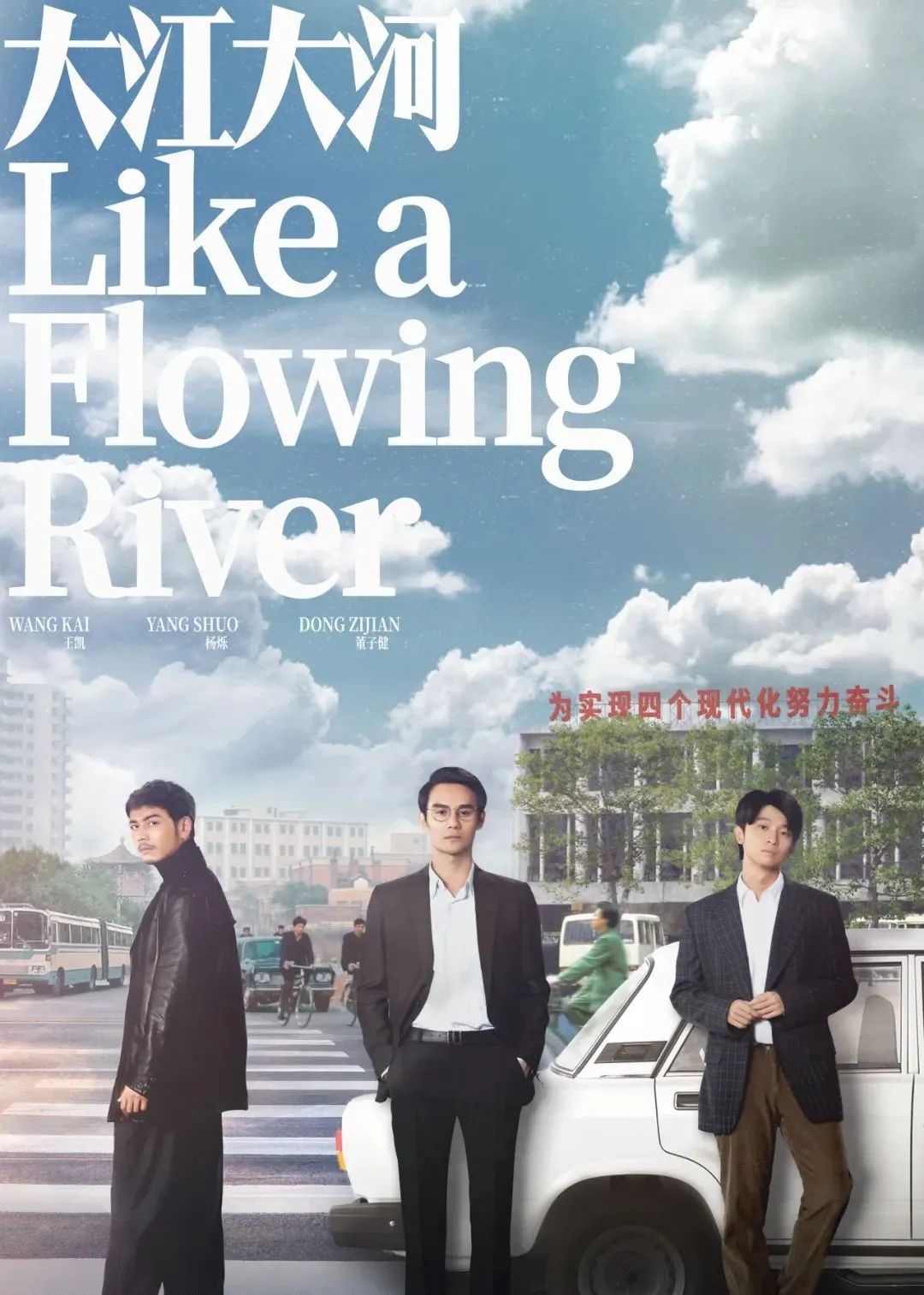
"The Great River" is a contemporary entrepreneurial series directed by Kong Sheng and Huang Wei, featuring leading performances from Wang Kai, Yang Shuo, and Dong Zijian. It has won the Excellent Television Series Award at the 32nd China Television "Feitian" Awards. The series is adapted from An Nai's novel "The East River Flows," telling the story of pioneers represented by Song Yuhui, Lei Dongbao, and Yang Xun, who explore and break through amid the waves of reform and opening up in China from 1978 to 1992.
The television series "The Great River" is currently broadcasting on the "Revisiting Classics" channel. Here, we compile the directors' insights from Kong Sheng and Huang Wei, along with the content from a seminar held on December 26, 2018. Let us follow the creators and experts to delve deeply into aspects such as the sense of the times, character development, emotional expression, and thematic interpretation for a profound reflection on quality creation.

Creators' Statement
Paying Tribute to the Era with Sincerity and Heart
—— Directors' Insights on "The Great River"
● Kong Sheng Huang Wei
From "The East River Flows" to "The Great River"
The television series "The Great River" is based on An Nai's novel "The East River Flows," which originated from her regret over the lack of a systematic and detailed record of the reforms and opening-up in China. Upon reviewing related materials, she felt a deep sense of shortcoming and thus, as a witness and direct participant in the reform and opening-up process, she comprehensively depicted the transformations in politics, economy, and social life since 1978, as well as the changes in people's mental outlook, culminating in this highly literary work that addresses that regret.
The characters Song Yuhui, Lei Dongbao, and Yang Xun in the novel represent three different economic forms: state-owned, collective, and individual economies. Their struggles illustrate the grand historical process of China's reform and opening-up, closely linking the fate of ordinary people with the changes of the great era.
Over the years, we have consistently endeavored to depict Chinese history through television, capturing the essence of the times through light and shadow, and reflecting the monumental changes of the era through the destinies of ordinary people. "The Great River" is a summary of our team's years of experience in creating realistic themes. As witnesses to the reform and opening-up and professionals in the television industry, we deeply feel our responsibility and obligation to capture this era and influence more people.

Restoring the Texture of the Times with Simple Techniques
At the outset of filming "The Great River," both directors reached a consensus: to shoot the drama using the most straightforward and authentic presentation techniques. Coming from a background in cinematography, we have a certain affinity for visuals and camera angles. In our respective spaces, we each have different interpretations for every scene, which in turn imbues the series with a harmonious yet distinct character.
"The Great River" spans a vast timeframe, and how to restore the texture of the era and create a genuine narrative context were the initial challenges we faced. Because it is so close to us, the creative team approached filming with a sense of tribute. Throughout the creation process, we maintained a common requirement for the story, scenes, characters, and emotions: authenticity. Our team's standards for detail are typically stringent; if a scene doesn't reflect reality well, the authenticity of the show becomes compromised. We want viewers to recall that era and feel a sense of familiarity; this is more effective than merely weaving a plot.

People-Centric; Not a "Purely Aesthetic" Work
In managing the overall tone, we believe it is necessary to convey positive energy. With reform and opening-up, fresh phenomena are emerging in the country that are exciting. We don’t aim to create a "purely aesthetic" piece but rather hope for high aspirations and standards rooted in the general public.
"The Great River" has achieved considerable success and response, yet it brings us even higher expectations. As industry professionals, we must continue to adhere to a people-centric production orientation, stay true to our original intentions, and forge ahead to continuously create film and television works worthy of the era.

Critics' Views
Glimpsing the Great Waves of the Times through the Lives of Ordinary People
—— Excerpts from the "The Great River" Seminar
● Li Zhun Famous Literary Critic
"The Great River" stands out among tribute dramas mainly in three aspects: first, the series itself has a grand, balanced, and solid structure, telling the stories of ordinary people against this grand backdrop; second, the details are genuine, evoking the breath of that era and life through the environment, props, and character designs; third, there is deep spiritual meaning, vividly reflected in the character Song Yuhui, who embodies the scientific spirit of "seeking truth from facts and continuous discovery."

● Zhong Chengxiang Member of the Central Research Institute of Culture and History, Noted Literary Critic
Director Kong Sheng comes from a cinematographic background and emphasizes visuals. "The Great River" indeed brings the camera directly into the characters' inner worlds, representing the history of the human spirit. We must cherish this excellent creative group formed in practical creation, leveraging its strengths. If we only pursue quantity, resulting in mediocre works, it holds no value.
I strongly endorse the portrayal of the character Song Yunping; her passing adds a tragic element to the drama, prompting my own reflections. Reform and opening-up is neither farce nor a smooth comedy; it is a serious drama filled with sacrifice and cost. Song Yunping reflects the true nature of social relations in that era, thus possessing unique insightful and aesthetic values.

● Yan Jingming Vice Chairman of the Chinese Writers' Association
"The Great River" values realism, reflecting real life not superficially, but directly addressing the tremendous changes occurring during the reform period. It self-consciously and vividly depicts both the unveiling and unfolding of the new era of reform and opening-up, as well as the arduous processes involved. The stories and characters come alive on screen, prompting audiences to remember history, cherish the present, and create the future. This reflective and enlightening significance serves as a crucial support for genuine realist creation.

● Li Jingsheng Vice President of the China Radio, Film, and Television Social Organization Federation
Authenticity is the foundation of realist creation, and "The Great River" delivers the most truthful presentation of the reform and opening-up: first, the characters' authenticity recreates the magnificent historical facts of the past 40 years. A steamed bun seller, a young rural man of poor standing, and a reckless village chief—these three insignificant characters gradually rise, stand tall, and finally thrive on the stage of reform and opening-up. Second, through addressing emotions and humanity, characters come to life. The love story between Lei Dongbao and Song Yunping, and the death of the old village chief, etc., bear little direct relation to reform and opening-up, yet without these emotions, characters cannot come alive, rendering the era false. Third, it captures details. Director Kong Sheng accurately grasps character traits amid the domestic saga, bringing forth and refining these details to restore the era.
The show pays tribute to that magnificent 40-year era, making artistic discoveries in areas where contemporary Chinese realistic themes lack substance. Conversely, all achievements are inherently referenced in literary works; what Chinese television series currently lacks is literature. Thus, we should encourage authors to produce more excellent works reflecting reality.

● Wang Yichuan Former Dean and Professor at the School of Arts, Peking University
"The Great River" differs from typical tribute dramas in that it does not merely glorify the era and ideals, nor does it depend on the charisma and looks of stars for attention. Instead, it relies on the actors' accurate and vivid interpretations of their roles, aspiring to a broader ambition. Through the artistic style of television dramas, it chronicles the history of China's reform and opening-up, revealing the historical heart of the reform era through the distinct fates of three male characters.

● Li Chunli Former Deputy Director of the Arts Department at "Guangming Daily"
This is a work that transforms attention into energy, showcasing a unique perspective on people awakening from ignorance during the reform and opening-up, reflecting their genuine internal changes in confronting the chaotic scenes during this transformative wave.
The protagonists continually face new issues and contradictions in the midst of reform, striving for new understanding while paying new prices. The title "The Great River" suggests the metaphor of waves sifting through sands; this process is heroic yet not tragic, ultimately imparting an uplifting spirit throughout the work.

● Lu Rong Professor at the School of Drama and Film, Communication University of China
This work rests on a foundation of serious literature, with a sincere creative attitude and an excellent, mature production team. It engages with the entire era and society, penetrating through the small joys and sorrows of individuals to reveal the vast world of humanity. It surveys reform and opening-up from a reflective historical perspective while maintaining a grand outlook throughout its creation.
All the characters in the series almost emerge from deep historical roots, each with a clear trajectory of development. The main and supporting characters weave into each other, forming an expansive and balanced canvas that collectively constitutes a literary memory of social change, revealing the historical reflections and poetic essence enveloped behind human stories.


